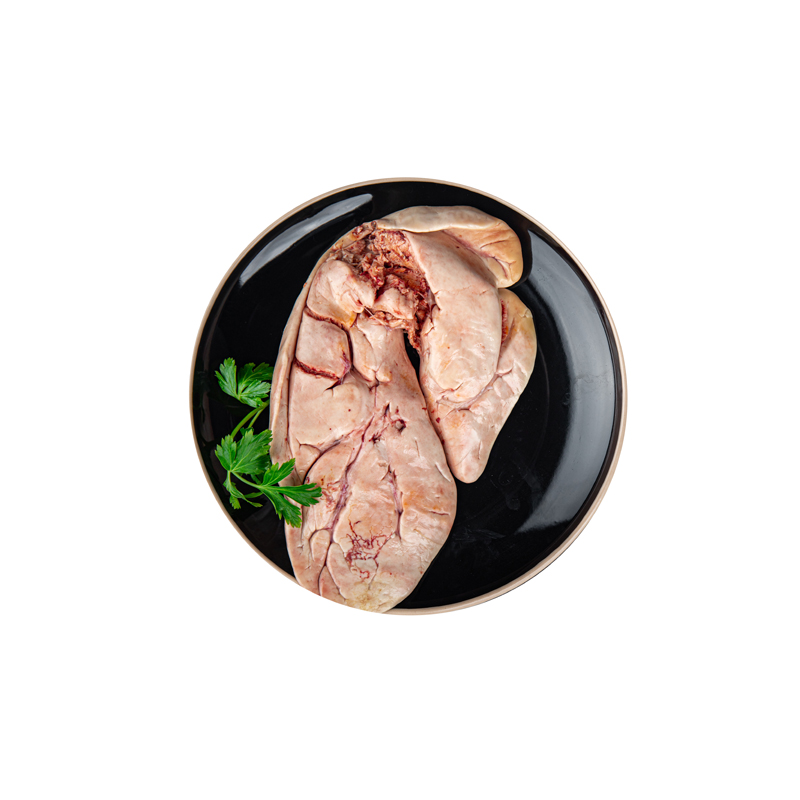
100 gr |
-- |
|
|---|---|---|
| Carbohydrate (gr) | 15.04 |
4928.47 |
| Protein (gr) | 3.59 |
1176.23 |
| Fat (gr) | 12.46 |
4083.43 |
| Fiber (gr) | 1.36 |
445.97 |
| Cholesterol (mg) | 14.64 |
4795.8 |
| Sodium (mg) | 325.27 |
106557.75 |
| Potassium (mg) | 392.16 |
128471.4 |
| Calcium (mg) | 78.15 |
25603.27 |
| Vitamin A (mg) | 46.04 |
15084.01 |
| Vitamin C (mg) | 6.16 |
2019.31 |
| Iron | 0.62 |
203.1 |
Cow lungs are a lesser-known organ meat that offers a wide range of essential nutrients, making them a nutrient-dense food option. Packed with folic acid, vitamins A and C, iron, zinc, and potassium, they contribute to various bodily functions, from boosting immunity to supporting cell repair and oxygen transport.
The calories of beef lung (white liver) are 120 calories per 100 grams.
Folic Acid
Folic acid is vital for DNA synthesis, cell division, and the production of red blood cells. It also plays a crucial role in preventing birth defects during pregnancy.
Vitamin A
Vitamin A supports vision, enhances skin health, and strengthens the immune system. It is also a key nutrient for maintaining healthy mucous membranes.
Vitamin C
Vitamin C in cow lungs acts as a powerful antioxidant, helping to neutralize harmful free radicals. It also boosts collagen production, improves skin elasticity, and supports wound healing.
Iron
The heme iron found in cow lungs is easily absorbed by the body, aiding in the prevention and treatment of anemia.
Zinc and Potassium
Zinc enhances the immune response and promotes tissue repair, while potassium regulates fluid balance, supports heart health, and ensures proper muscle function.
Boosts Immune Function
Cow lungs are a rich source of vitamin A, vitamin C, and zinc, all of which work together to fortify the immune system, reduce inflammation, and combat infections.
Supports Oxygen Transport
Iron in cow lungs plays a vital role in the production of hemoglobin, ensuring efficient oxygen transport throughout the body.
Promotes Skin and Tissue Health
The combination of vitamin C, zinc, and vitamin A contributes to healthy skin, faster wound healing, and stronger connective tissues.
Improves Cellular Health
Folic acid in cow lungs supports the production of new cells and helps maintain the health of existing ones, making it particularly beneficial for individuals in recovery or during growth phases.
While cow lungs are nutrient-dense, they also have a high cholesterol content. Excessive consumption can contribute to elevated cholesterol levels, increasing the risk of cardiovascular diseases. Individuals with heart conditions or high cholesterol levels should limit their intake of cow lungs and similar organ meats. As with other organ meats, moderation is essential for maintaining a balanced diet.
Cow lungs are featured in various traditional dishes across different cultures. They are typically boiled, stewed, or fried, and are often paired with aromatic spices to enhance their flavor. They are also used as a key ingredient in certain sausages or stews. Preparing cow lungs requires thorough cleaning and cooking to ensure safety and enhance taste.